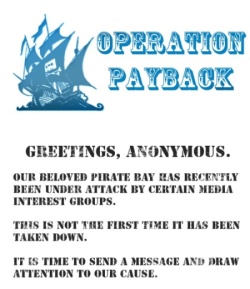Anonymous will attack until it 'stops being angry'

Anonymous, the online collective engaged in a global cyber-war with the pro-copyright industry, has said it will not end its attacks until it stops being angry at its enemies.

Anonymous's campaign against anti-piracy organisations has been dubbed 'Operation Payback'. Photo credit: Darren Pauli/ZDNet Australia
In an interview on Wednesday with security company PandaLabs, which has been in contact with Anonymous since the attacks and counter-attacks began, an organiser of the group said Anonymous had a mission to "fight back against the anti-piracy lobby". The organiser said that the collective had been provoked by the UK Digital Economy Bill and "three-strikes legislation in the EU" — a possible reference to France's Hadopi laws or MEPs' recent backing of a copyright crackdown document. The organiser added that their attacks would "keep going until we stop being angry".
The attacks by Anonymous, which describes itself as non-hierarchical anarchy, began after an Indian security firm called AiPlex Software assaulted the servers of file-sharing sites such as The Pirate Bay with distributed denial-of-service (DDoS) assaults. Anonymous responded with its own DDoS attacks in a campaign called 'Operation Payback', first targeting the websites of US rights holder groups the Motion Picture Association of America (MPAA) and the Recording Industry Association of America (RIAA), then turning to smaller companies such as AiPlex and UK law firms who act on behalf of rights holders.
One of those law firms was ACS:Law, which is under investigation by the Solicitors Regulation Authority for sending letters to thousands of people suspected of unlawfully file-sharing pornography and other media, and asking for money in exchange for not taking the suspected infringers to court. In the wake of that attack, ACS:Law appears to have inadvertently exposed files, including the personal details of thousands of letter-recipients, to the public. Anonymous members have since distributed these files online. The case is now being looked at by the UK Information Commissioner's Office.
As a side-effect of that case, BT also admitted that it had emailed the details of hundreds of its customers to ACS:Law in an unencrypted format.
The websites of multiple anti-piracy organisations and their affiliates in the UK, the US, India and Australia continue to come under DDoS attack. According to PandaLabs, anonymous chat servers — which Anonymous uses to organise its attacks — are also being hit, with some evidence to suggest these strikes are coming from botnets controlled by AiPlex.
In the PandaLabs interview, the Anonymous organiser said unlawful file-sharing was "the next step in a cultural revolution of shared information", and the "beginnings to an information singularity; a beginning of true 'equality of opportunity', regardless of wealth or capacity".
The organiser said Anonymous members were prepared to go to jail for the campaign, but had "taken every measure we can to make sure that our anonymity remains intact". The interviewee said most participants in the attacks were aware of their illegality, but "in a world where our voice is ignored we feel we have no choice but to revert to direct action".
"More importantly, why isn't this question [about willingness to go to jail] asked to the very people who hired AiPlex to attack us in the first place?" the organiser is quoted as saying.
The interviewee identified the full list of Anonymous's victims as being: the MPAA; RIAA; The British Phonographic Industry (BPI); the Australian Federation Against Copyright Theft (Afact); the Dutch trade association Stichting Bescherming Rechten Entertainment Industrie Nederland (BREIN); ACS:Law; AiPlex; internet policing specialist Web Sheriff; and DG Legal. He or she said Anonymous's ultimate goal was for such media authorities to "basically go the fuck away altogether".